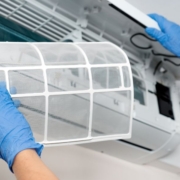How Often to Change AC Filter
Air conditioning systems rely on clean filters to operate efficiently and maintain good indoor air quality. AC filters trap dust, pollen, pet dander, and other particles. Over time, these filters become clogged, reducing airflow, increasing energy consumption, and placing extra strain on the system. Knowing how often to change an AC filter is crucial for maintaining performance and longevity of the unit.
Importance of AC Filter Replacement
A clean AC filter allows air to flow freely through the system, helping the unit cool or heat the space efficiently. Dirty filters can cause the system to work harder, leading to higher electricity bills and potential component damage. They can also reduce indoor air quality, triggering allergies or respiratory issues. Most modern filters are designed to remove particles as small as 0.3 microns, including dust mites, pollen, and smoke, making timely replacement essential.
Recommended AC Filter Replacement Frequency
The frequency of changing an AC filter depends on the type of filter, system usage, household conditions, and environment. Standard recommendations are as follows:
Fiberglass Filters: These are the most basic type and typically need replacement every 30 days. They are less efficient at trapping smaller particles but are cost-effective for frequent replacement.
Pleated Filters: These have a larger surface area and higher efficiency. Replacement is usually every 60 to 90 days. Some high-efficiency pleated filters may last up to six months under moderate conditions.
High-Efficiency Filters: HEPA or electrostatic filters capture smaller particles and may last up to six months. However, in households with pets, smokers, or high dust levels, replacement every 60 to 90 days may be necessary.
Electronic Air Cleaners: These systems require periodic cleaning rather than full replacement. The recommended interval depends on the manufacturer’s instructions, generally every 3 to 6 months.
System usage affects filter life as well. Homes with AC running frequently, particularly during hot or cold seasons, may require more frequent replacement. In contrast, units used less often may maintain efficiency with less frequent changes.
Factors Influencing AC Filter Replacement
Several factors can shorten or lengthen the filter’s lifespan:
Pets: Homes with dogs, cats, or other animals generate more hair and dander, which clogs filters faster.
Air Quality: Areas with higher dust, pollen, or pollution levels may require more frequent changes.
Occupancy: Larger households produce more indoor particles and can necessitate more frequent replacement.
HVAC System Type: Central air systems, ductless mini-splits, and window units may have different filter types and capacities, influencing replacement frequency.
Signs a Filter Needs Replacement
Even if a filter has not reached the suggested replacement interval, certain signs indicate it may be time for a change:
Reduced airflow from vents
Unusual odors from the AC system
Increased dust accumulation on furniture
Frequent system cycling or longer cooling/heating times
Visible dirt or discoloration on the filter
Regular inspection every month can prevent the system from running with a clogged filter and maintain consistent performance.
FAQ
Can I clean an AC filter instead of replacing it?
Some reusable filters can be cleaned with water or a vacuum, but disposable filters must be replaced. Check the manufacturer’s guidelines.
Does changing the filter improve energy efficiency?
Yes. Clean filters reduce system strain, which can lower energy consumption by 5% to 15%.
Are all filters the same size?
No. Filters vary in dimensions and efficiency ratings. Always use the size recommended for the system.
Does one filter replacement schedule fit all homes?
No. Factors such as pets, occupancy, and environmental conditions require adjustments to the replacement schedule.
Can neglecting filter replacement damage the AC?
Yes. Clogged filters can cause coil freezing, compressor damage, and reduced system lifespan.
Conclusion
Replacing AC filters regularly is essential for maintaining system efficiency, reducing energy costs, and improving indoor air quality. Standard schedules range from 30 days for basic fiberglass filters to 90 days or more for pleated or high-efficiency filters, but environmental and household factors can require more frequent changes. Monitoring airflow, inspecting filters visually, and adhering to manufacturer recommendations ensures the air conditioning system operates effectively and lasts longer. Consistent maintenance not only protects the system but also supports a healthier indoor environment.

